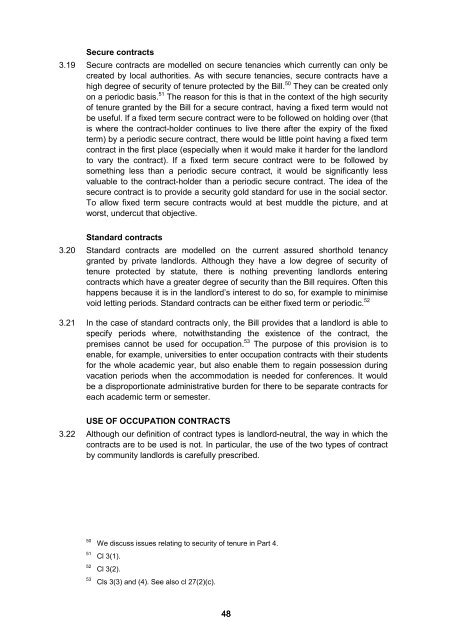Renting Homes: The Final Report - Law Commission
Renting Homes: The Final Report - Law Commission
Renting Homes: The Final Report - Law Commission
Create successful ePaper yourself
Turn your PDF publications into a flip-book with our unique Google optimized e-Paper software.
Secure contracts<br />
3.19 Secure contracts are modelled on secure tenancies which currently can only be<br />
created by local authorities. As with secure tenancies, secure contracts have a<br />
high degree of security of tenure protected by the Bill. 50 <strong>The</strong>y can be created only<br />
on a periodic basis. 51 <strong>The</strong> reason for this is that in the context of the high security<br />
of tenure granted by the Bill for a secure contract, having a fixed term would not<br />
be useful. If a fixed term secure contract were to be followed on holding over (that<br />
is where the contract-holder continues to live there after the expiry of the fixed<br />
term) by a periodic secure contract, there would be little point having a fixed term<br />
contract in the first place (especially when it would make it harder for the landlord<br />
to vary the contract). If a fixed term secure contract were to be followed by<br />
something less than a periodic secure contract, it would be significantly less<br />
valuable to the contract-holder than a periodic secure contract. <strong>The</strong> idea of the<br />
secure contract is to provide a security gold standard for use in the social sector.<br />
To allow fixed term secure contracts would at best muddle the picture, and at<br />
worst, undercut that objective.<br />
Standard contracts<br />
3.20 Standard contracts are modelled on the current assured shorthold tenancy<br />
granted by private landlords. Although they have a low degree of security of<br />
tenure protected by statute, there is nothing preventing landlords entering<br />
contracts which have a greater degree of security than the Bill requires. Often this<br />
happens because it is in the landlord’s interest to do so, for example to minimise<br />
void letting periods. Standard contracts can be either fixed term or periodic. 52<br />
3.21 In the case of standard contracts only, the Bill provides that a landlord is able to<br />
specify periods where, notwithstanding the existence of the contract, the<br />
premises cannot be used for occupation. 53 <strong>The</strong> purpose of this provision is to<br />
enable, for example, universities to enter occupation contracts with their students<br />
for the whole academic year, but also enable them to regain possession during<br />
vacation periods when the accommodation is needed for conferences. It would<br />
be a disproportionate administrative burden for there to be separate contracts for<br />
each academic term or semester.<br />
USE OF OCCUPATION CONTRACTS<br />
3.22 Although our definition of contract types is landlord-neutral, the way in which the<br />
contracts are to be used is not. In particular, the use of the two types of contract<br />
by community landlords is carefully prescribed.<br />
50 We discuss issues relating to security of tenure in Part 4.<br />
51 Cl 3(1).<br />
52 Cl 3(2).<br />
53 Cls 3(3) and (4). See also cl 27(2)(c).<br />
48

















